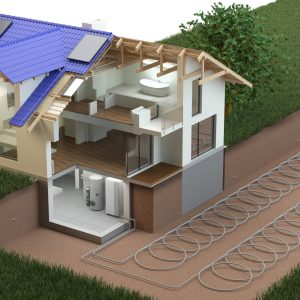We have the expertise, experience and management systems to service and maintain heat pumps.
Ground source heat pumps use pipes buried in the garden to extract heat from the ground. This can then be used to heat radiators, water and underfloor heating systems in your home. Ground source heat pumps circulate a mixture of water and antifreeze around a loop of pipe absorbing heat from the ground and then passes through a heat exchanger into the heat pump. The ground stays at a fairly constant temperature under the surface, so the heat pump can be used throughout the year.
The length of the ground loop depends on the size of your home and the amount of heat you need. Longer loops can draw more heat from the ground, but need more space to be buried in. If space is limited, a vertical borehole can be drilled instead. Normally the loop is laid flat or coiled in trenches about two metres deep, but if there is not enough space in your garden you can install a vertical loop down into the ground to a depth of up to 100 metres for a typical domestic home.
Air source heat pumps absorb heat from the air outside. The heat is then used to heat your home through radiators, underfloor heating systems, or warm air convectors. You’ll need a place outside your home where a unit can be fitted to a wall or placed on the ground with plenty of space around it to get a good flow of air.
There are two main types of air source heat pump system an air-to-water system and air-to-air system. An air-to-water system distributes heat via your wet central heating system, and a air-to-air system produces warm air which is circulated by fans to heat your home which will not provide you with hot water. Heat pumps have some impact on the environment as they need electricity to run, but the heat they extract from the ground, air, or water is constantly being renewed naturally.
Heat pump systems typically come with a warranty of two to three years. You can expect them to operate for 20 years or more, however they do require regular scheduled maintenance.
Please contact us to enquire about our engineering servicing and maintenance.
Running costs will vary depending on a number of factors – including the size of your home, and how well insulated it is, and what room temperatures you are aiming to achieve.
You may be able to receive payments for the heat you generate using a heat pump through the government’s Renewable Heat Incentive (RHI).
You will still have to pay fuel bills with a heat pump because it is powered by electricity, but you will save on the fuel you are replacing. If the fuel you are replacing is expensive you are more likely to make a saving.
If your old heating system was inefficient, you are more likely to see lower running costs with a new heat pump.
If the heat pump is providing hot water, then this could limit the overall efficiency. You might want to consider solar thermal heating to provide hot water in the summer and help keep your heat pump efficiency up.
Learn how to control the system so you can get the most out of it. You will probably need to set the heating to come on for longer hours, but you might be able to set the thermostat lower and still feel comfortable.

We’re here to help you with your requirements. Speak to our Experts.
We’d love to talk to you, get in touch with your heat requirements. We can help answer your renewable energy questions.

We’re here to help you with your requirements, speak to our Experts.